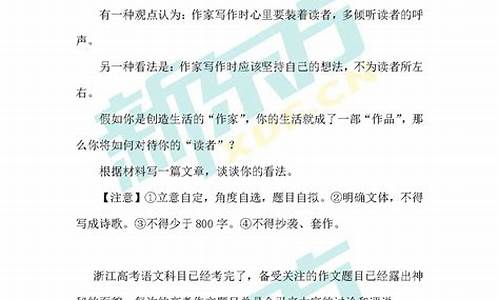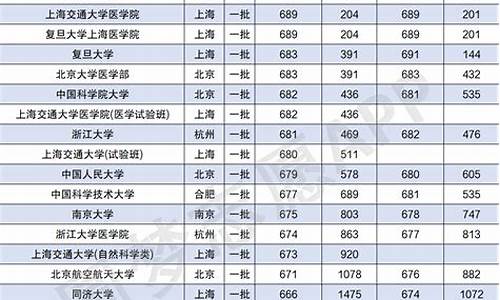您现在的位置是: 首页 > 教育研究 教育研究
英语阅读理解高考_英语阅读理解高考推荐
tamoadmin 2024-05-16 人已围观
简介高考英语阅读理解精品训练2017 近几年高考英语阅读主要有猜测词义、理解主旨大意、推理判断、对文章的细节理解、 数据推算等几种题型。为了帮助大家备考高考英语阅读理解题,我分享了一些高考英语阅读理解练习,希望能对大家有所帮助! 阅读理解练习1 Not many years ago, a wealthy and rather strange ol

高考英语阅读理解精品训练2017
近几年高考英语阅读主要有猜测词义、理解主旨大意、推理判断、对文章的细节理解、 数据推算等几种题型。为了帮助大家备考高考英语阅读理解题,我分享了一些高考英语阅读理解练习,希望能对大家有所帮助!
阅读理解练习1
Not many years ago, a wealthy and rather strange old man named Johnson lived alone in a village in the south of England. He had made a lot of money in trading with foreign countries. When he was seventy?five, he gave ? 12,000 to the village school to buy land and equipment (设备) for a children?s playground.
As a result of his kindness, many people came to visit him. Among them was a newspaperman. During their talk, Johnson remarked that he was seventy-five and expected to live to be a hundred. The newspaperman asked him how he managed to be healthy at seventy?five. Johnson had a sense of humour (幽默). He liked whisky (威士忌酒) and drank some each day. ?I have an injection (注射) in my neck each evening.?he told the newspaperman, thinking of his evening glass of whisky.
The newspaperman did not understand what Johnson meant. In his newspaper he reported that Johnson was seventy?five and had a daily injection in his neck. Within a week Johnson received thousands of letters from all over Britain, asking him for the secret of his daily injection.
1. Johnson became a rich man through
A. doing business. B. making whisky. C. cheating. D. buying and selling land.
2. The gift of money to the school suggests that Johnson
A. had no children. B. was a strange man.
C. was very fond of children. D. wanted people to know how rich he was.
3. Many people wrote to Johnson to find out
A. what kind of whisky he had. B. how to live longer.
C. how to become wealthy. D. in which part of the neck to have an injection.
4. The newspaperman
A. should have reported what Johnson had told him.
B. shouldn?t have asked Johnson what injection he had.
C. was eager to live a long life.
D. should have found out what Johnson really meant.
5. When Johnson said he had an injection in his neck each evening, he really meant that
A. he liked drinking a glass of whisky in the evening.
B. he needed an injection in the neck.
C. a daily injection in the evening would make him sleep well.
D. there was something wrong with his neck.
阅读理解练习2?I?m very tired from working here,?said Jean to her friend Kate,? I?m on my feet from morning to night. For the first quarter of the day, I clean up the counter (柜台) and set the tables. For the next quarter, I help in the kitchen. For the second half of my workday, I take orders at the counters.?
?Kate, I wish I had your job,?Jean went on. ?For four hours you just sit at the cash register (收款台) taking in money.?
?But I spend two more hours in the kitchen (厨房) than you do,?said Kate. ?It?s tiring to cook over a hot stove. I don?t think you?d really want my job. In fact, I?d like your job.?
1. Both Jean and Kate probably work in a
A. hotel B. library C. lab D. shop
2. How long did they work every day?
A. eight hours B. twelve hours. C. Ten hours D. Nine hours
3. How long did Kate spend in the kitchen?
A. a quarter day. B. A half day. C. One-third day. D. Three-fourths day.
4. From this passage we can see that
A. they are both interested in their work. B. their work is neither tiring nor busy.
C. both of them are tired of their work. D. they?ve decided to give up their work.
5. Give a proper proverb (谚语) to Jean and Kate.
A. It?s never too late to learn.
B. It?s no use crying over spilt milk.
C. The grass is always greener on the other side.
D. One swallow(燕子) does not make a summer.
阅读理解练习3In 1985 a French television company sent its reporters to the Paris Metro. They took cameras to see what passengers would do if they saw someone attached on the platform or in the trains. They acted out incidents. The incidents looked real but they were all done with the help of actors. However, very few people tried to help, and most passengers pretended not to notice. in one incident, a foreigner was attacked by three men. The attack was on a train which was quite full, and although one man tried to get the passengers to help, they all refused. It seems that such behaviour(行为) is not unusual, but the question is why? Is it a problem of big cities, or would the same thing happen anywhere? To discuss these questions, we have in the studio(演播室) Professor Wilson, who is an expert on the subject?
1. Who did the experiment?
A. A French television company. B. The Paris Metro.
C. The City Government of Paris. D. Professor Wilson.
2. What did the experiment try to find out?
A. How a foreigner was attacked on the train.
B. How passengers helped each other on the platform.
C. Passengers? reactions towards incidents.
D. Actors? performances during incidents.
3. What was the finding of the experiment?
A. Passengers helped a lot during incidents.
B. Very few foreigners were on the train.
C. Very few passengers tried to help during incidents.
D. Some people were good at acting on the train.
4. Who do the underlined words one man refer to?
A. One of the three men who attacked a foreigner.
B. One of the actors who took part in the experiment.
C. One of the passengers who were on the train.
D. One of the reporters who were sent to the Paris Metro.
参考答案:
1A 2 C 3 D 4 D 5 A
1A 2 A 3 B 4 C 5 C
1D 2 C 3 C 4 B
;高考英语阅读理解常见单词
高考英语阅读理解,词汇量大,常常考一些没有学过的单词,对学生的阅读造成了一定的影要想提高学生的英语阅读水平,首先要将这些常出现在阅读理解中不认识的高频词进行汇总,然后记忆。以下是我为大家收集整理的高考英语阅读理解的常见单词,大家一起来阅读学习一下吧!
高考英语阅读理解常见单词
1.alter v. 改变,改动,变更
2.burst vi./n. 突然发生,爆裂
3.dispose vi. 除掉;处置;解决;处理(of)
4.blast n. 爆炸;气流 vi. 炸,炸掉
5.consume v. 消耗,耗尽
6.split v. 劈开;割裂;分裂 a.裂开的
7.spit v. 吐(唾液等);唾弃
8.spill v. 溢出,溅出,倒出
9.slip v. 滑动,滑落;忽略
10.slide v. 滑动,滑落 n. 滑动;滑面;幻灯片
11.bacteria n. 细菌
12.breed n. 种,品种 v. 繁殖,产仔
13.budget n. 预算 v. 编预算,作安排
14.candidate n. 候选人
15.campus n. 校园
16.liberal a. 慷慨的;丰富的;自由的
17.transform v. 转变,变革;变换
18.transmit v. 传播,播送;传递
19.transplant v. 移植
20.transport vt. 运输,运送 n. 运输,运输工具
21.shift v. 转移;转动;转变
22.vary v. 变化,改变;使多样化
23.vanish vi. 消灭,不见
24.swallow v. 吞下,咽下 n. 燕子
25.suspicion n. 怀疑,疑心
26.suspicious a. 怀疑的,可疑的
27.mild a. 温暖的,暖和的;温柔的,味淡的
28.tender a. 温柔的;脆弱的
29.nuisance n. 损害,妨害,讨厌(的人或事物)
30.insignificant a. 无意义的,无足轻重的;无价值的
31.accelerate vt. 加速,促进
32.absolute a. 绝对的,无条件的;完全的
33.boundary n. 分界线,边界
34.brake n. 刹车,制动器 v. 刹住(车)
35.catalog n. 目录(册) v. 编目
36.vague a. 模糊的,不明确的
37.vain n. 徒劳,白费
38.extinct a. 绝灭的,熄灭的
39.extraordinary a. 不平常的,特别的,非凡的
40.extreme a. 极度的,极端的 n. 极端,过分
41.agent n. 代理人,代理商;动因,原因
42.alcohol n. 含酒精的饮料,酒精
43.appeal n./vi. 呼吁,恳求
44.appreciate vt. 重视,赏识,欣赏
45.approve v. 赞成,同意,批准
46.stimulate vt. 刺激,激励
47.acquire vt. 取得,获得;学到
48.accomplish vt .完成,到达;实行
49.network n. 网状物;广播网,电视网;网络
50.tide n. 潮汐;潮流
51.tidy a. 整洁的,整齐的
52.trace vt. 追踪,找到 n. 痕迹,踪迹
53.torture n./vt. 拷打,折磨
54.wander vi. 漫游,闲逛
55.wax n. 蜡
56.weave v. 织,编
57.preserve v. 保护,保存,保持,维持
61. abuse v. 滥用,虐待;谩骂
62. academic a. 学术的;高等院校的;研究院的
63. academy n. (高等)专科院校;学会
64. battery n. 电池(组)
65. barrier n. 障碍;棚栏
66. cargo n. (船、飞机等装载的)货物
67. career n. 生涯,职业
68. vessel n. 船舶;容器,器皿;血管
69. vertical a. 垂直的
70. oblige v. 迫使,责成;使感激
71. obscure a. 阴暗,模糊
72. extent n. 程度,范围,大小,限度
73. exterior n. 外部,外表 a. 外部的,外表的
74. external a. 外部的,外表的`,外面的
75. petrol n. 汽油
76. petroleum n. 石油
77. delay vt./n. 推迟,延误,耽搁
78. decay vi. 腐烂,腐朽
79. decent a. 像样的,体面的
80. route n. 路;路线;航线
81. ruin v. 毁坏,破坏 n. 毁灭,[pl.]废墟
82. sake n. 缘故,理由
83. satellite n. 卫星
84. scale n. 大小,规模;等级;刻度
85. temple n. 庙宇
86. tedious a. 乏味道,单调的
87. tend vi.易于,趋向
88. tendency n.趋向,趋势
89. ultimate a. 极端的,最大的,最终的 n. 极端
90. undergo v. 经历,遭受
91. abundant a. 丰富的,充裕的,大量的
92. adopt v. 收养;采用;采纳
93. adapt vi. 适应,适合;改编,改写 vt. 使适应
94. bachelor n. 学士,学士学位;单身汉
95. casual a. 偶然的,碰巧的;临时的;非正式的
96. trap n. 陷阱,圈套 v. 设陷阱捕捉
97. vacant a. 空的,未占用的
98. vacuum n. 真空,真空吸尘器
99. oral a. 口头的,口述的,口的
100. optics n. (单、复数同形)光学
101. organ n. 风琴
102. excess n. 过分,过量,过剩
103. expel v. 驱逐,开除,赶出
104. expend v. 消费
105. expenditure n. 支出,消费;经费
106. expense n. 开销,费用
107. expensive a. 花钱多的;价格高贵的
108. expand v. 扩大,扩张;展开,膨胀
109. expansion n. 扩大,扩充;发展,膨胀
110. private a. 个人的
111. individual a. 个别的,单独的 n. 个人,个体
112. personal a. 个人的;亲自的
114. personnel n. [总称]人员,员工;
115. the Pacific Ocean 太平洋
116. the Atlantic Ocean 大西洋
117. the Arctic Ocean
118. the Antarctic Ocean
119. grant vt. 授予,同意,准予
119. grand a. 宏伟大,壮丽的,重大的
120. invade v.
121. acid n. 酸,酸性物质 a. 酸的;尖刻的
122. acknowledge v. 承认;致谢
123. balcony n. 阳台
124. calculate vt. 计算,核算
125. calendar n. 日历,月历
126. optimistic a. 乐观
127. optional a.
128. outstanding a.
129. export n.
130. import n.
131. impose vt. 把..
132. religion n.
133. religious a.
134. victim n.
135. video n.
136. videotape n.
137. offend v.
138. bother v.
139. interfere v.
140. internal a.
141. beforehand ad. 预先,事先
142. racial a.
143. radiation n.
144. radical a.
145. range n. 幅度,范围 v. (在某范围内)变动
146. wonder n.
147. isolate vt. 使隔离,使孤立
148. issue n.
149. hollow a. 空的,中空的,空虚道
150. hook n. 钩 vt. 钩住
;








